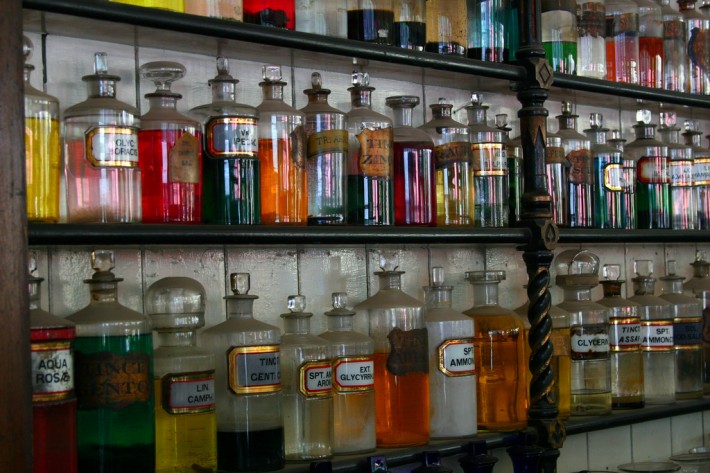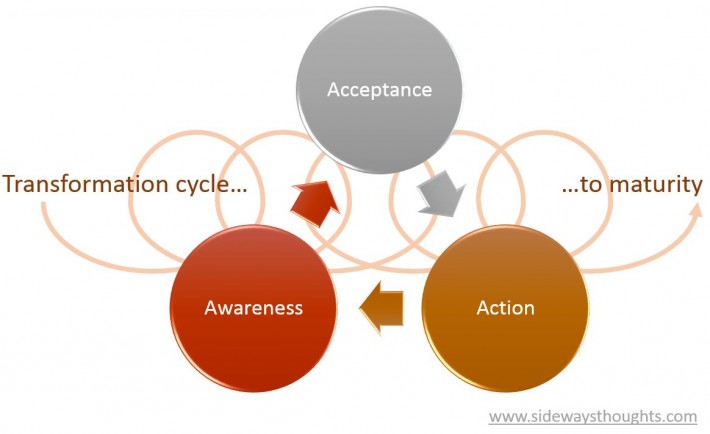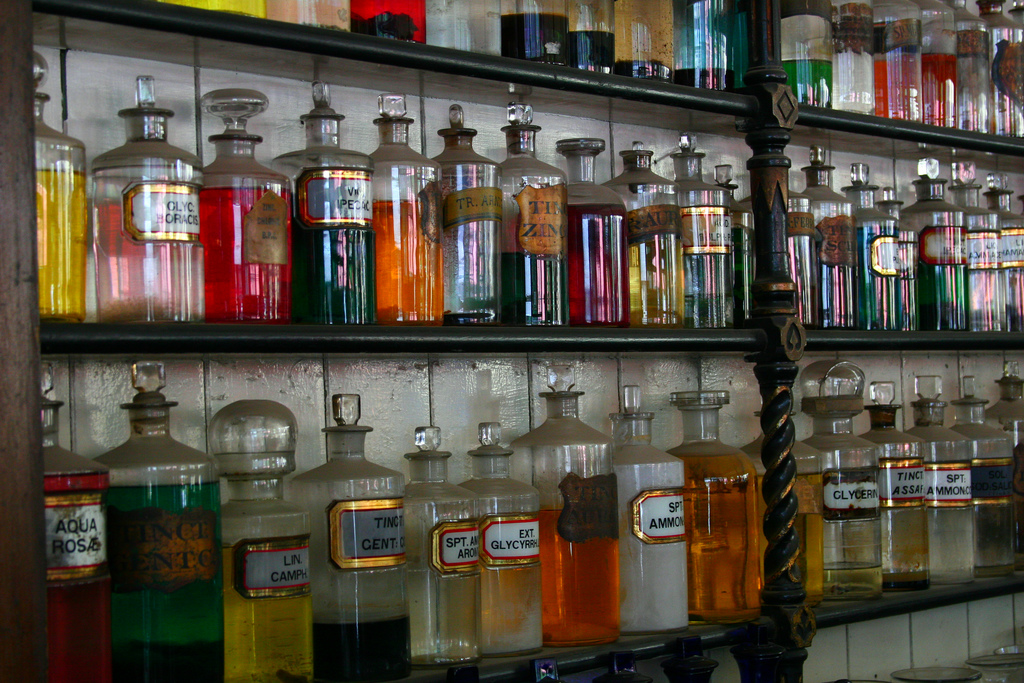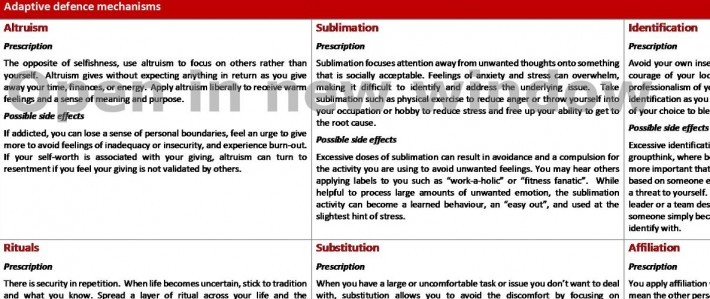Our defence mechanism pharmacy
It’s the turn of a year again – a time many people use to make resolutions, promise to stop doing some things and commit to start doing others. The calendar acts as a magic wand, with power to do for us what we may feel we are unable to do at any other time.
Why is it that the end of the year holds such promise to commit and do something different in the New Year? And why is it that resolutions have such a poor success rate? It’s almost as if there is something inside of us working against our desire for change.
When thinking about habitual hidden responses, the concept of defence mechanisms may be worth exploring.
Defining our defences
Defence mechanisms are those automatic and unintentional behaviour and thought patterns that we use to protect against stressful situations. One reason why we may feel more able to commit to new behaviour in the holidays is that the time away from work may offer relative freedom from stress, allowing our defences to relax.
These defences are often hidden to ourselves but they can come up in predictable ways. Here’s a few examples of how defence mechanisms play out based on a few research projects over the past decade or so:
- When we hear negative feedback about a group we identify with, such as a sports team, political party, religion, or employer, we are more likely to repress memories that may put that group in a poor light.
- If we see ourselves as someone who purchases things with environmental or ethical sustainability in mind, we justify any unsustainable consumption behaviour by using a range of defence mechanisms, including denial, passive-aggression, projection, rationalisation, minimisation, repression, altruism, and humour.
- If you are a young male in your late-teens to early 20s and you exhibit violent behaviour, you are more likely to have tendencies towards denial and projection and less likely to apply the more mature defence mechanism of identification with others.
- If you are unsatisfied in your marriage, you are more likely to be using immature defensive mechanisms
- You are more likely to have a higher degree of emotional intelligence if you use adaptive defensive mechanisms such as sublimation and humour than if you use maladaptive defensive mechanisms such as projection and denial.
The examples above may seem like common sense. Indeed, our natural responses are common and predictable. Our personality can be considered as a form of defence, and based on your personality you may have a tendency to favour certain defence mechanisms over others.
One way to think of our defences is to consider them like medicine we have learned to take to alleviate various psychological aches and pains.
The medicine metaphor

We refine our particular brand of medication over the years as we find out which drugs work for our internal genetic make-up and our external situation. We learn how much we can take before we overdose, mix cocktails of defence combinations to suit our needs, and create situations and develop relationships that allow us to continue to dose at our self-defined comfort level.
We are our own chemical supply chain. We act as general practitioner who writes our own prescriptions, the pharmacist who fills those prescriptions, and the user who pops the pills, applies the cream, and drinks the syrup.
Like any medicine, our mental defences are not all bad and in fact can help navigate the challenges of life. Some of our mental defences such as sublimation diverts our attention to help alleviate anger, fear or shame to levels that are no longer overwhelming and allow us to get to the underlying cause. Other prescriptions such as humour, altruism and identification allow us to better integrate into different social situations.
Like fine print on the side of the pill bottle, we tend to gloss over the details and ignore the side effects. That is, until we have a reaction to the medication or our usage prevents us from getting what we want out of life. It is often our discomfort that leads us to investigate.
An overview of a few of the more well-known defences are in the linked image below:
Defending the defences
Our defence mechanisms are a natural response and are not inherently good or bad. That said, some defences are deemed to be less effective as we mature. In a way, our maturity can be assessed based on our awareness of our defences and which defence mechanisms we use. Someone who consistently projects their anger onto others could be considered childish, whereas someone who develops a discipline of physical exercise to deal with stress could be considered to have an adult response.
So if our defences are hidden and cause us to respond in ways that are not beneficial, how do we change? One approach is a three-stage process of Awareness, Acceptance, and Action. We become aware of our responses when we receive feedback from others or ourselves, we have some level of acceptance about the validity of that feedback, and we then take action to change. There are, however, many barriers at each stage of this change process.
Awareness barriers: Defences are hidden and keep us safe
Most people are not aware of their own habitual response. Defence mechanisms are often difficult to see by the person who is using the defences, even if those defences are glaringly apparent to everyone else. Imagine the following series of awkward conversations:
- “You’re being defensive.”
- “No I’m not.”
- “You’re minimising.”
- “Not really.”
- “You’re rationalising”
- “I have good reason to.”
An initial reaction when presented with our defences is to be defensive. Our defensive responses develop unconsciously as a natural protective mechanism. It can be difficult to bring these responses into consciousness, particularly as the very act of exposing our defences can cause us to feel unsafe. If we are not mindful of our own response, we may never become aware of our habitual reactions.
Acceptance barriers: Defences lead to judgement
We may think that becoming aware of our defensive mechanisms is enough to remove them. This is not always the case. Awareness may only serve to reinforce and embed the defences.
There is an adage that what we focus on, we create. If we spend all of our time looking for defence mechanisms in others or ourselves, then the defences may be all we find. Self-judgement can lead to further defensive behaviour and prevent full acceptance. Acceptance is more than awareness. It means:
- accepting the feedback about the behaviour is relevant;
- accepting the realistic impact of the behaviour;
- accepting that the behaviour and the impact it is having may not be serving you; and
- accepting that you have value and are worth the effort to change.
Action barriers: Defences are familiar
We have a tendency to create environments where feedback we receive reinforces our preferred situation. If you are always feeling bad about yourself, you may create scenarios that reinforce your self-belief. If you are constantly stressed, you may perceive everything happening around you as adding to those stress levels.
Actions that are contrary to these habitual patterns may be unfamiliar. We tend to go with thoughts and actions that we are familiar with, even though those thoughts and actions may not be beneficial in the long run. Changing those actions is like learning any new skill, requiring one small step at a time, may involve trial and error, and often requires outside assistance.
Maturing through transition

This cycle of awareness, acceptance and action occurs in life as we go through transformations. Sometimes these transformations are small, iterative, and continuous. Other times the transformation may be a significant event. But we know from reflecting on our own lives and through research into others’ lives that it is only thought these transformations that we grow.
For example, one study looked at 1,000 men and women who achieved extraordinary outcomes. The research asked why some child prodigies did not continue on to greatness while other individuals who may not have been as promising early on became self-made successes. A common factor for those who continued on to realise greater potential, regardless of their starting point, was the presence of a transformation in the person’s life.
For some, this transformation is a natural progression. Studies of young children show that we naturally shift from immature to mature defences as we become adults. For others, there is a need to be what one paper referred to as being born twice, or as some religions call it being “born again”. This can be a similar feeling to entering a New Year, of seeking out a transformation from old to new.
The psychology of life stages and transitions shows that we go through a series of these transformations as we convert our inherent defence mechanisms into more mature forms. We let go of our need to defend ourselves and develop an interest and care for others. It is often only through taking our eyes off ourselves and being vulnerable that we overcome our defences.
A prescription for addiction
Like any medication, defence mechanisms can become addictive, preventing a person from living life to the fullest. The prescription below may be something to consider if there are habitual patterns that are preventing your resolutions from being realised:
- Mindfulness
Mindfulness allows you to be aware of when you are using your defence mechanisms. It does not mean you will not be defensive, but it may allow you to make your unconscious responses conscious, accept your thoughts and behaviours as valid and valuable, and make a choice as to what you do with them in the moment.
A daily practice of meditation is a good habit to consider. You can read more about mindfulness by following the link here.
- Trusted Outside Feedback
It can be difficult for you to change the rules you have created for your own game. It often requires someone external that you trust to help you identify and accept which rules may need to be changed. These rules come in the form of your beliefs and narratives about the world. As a case in point, the presence of a coach or mentor has been found to be a key factor in helping develop self-esteem through help in achieving realistic goals.
- A Purpose Outside Yourself
Our defence mechanisms are triggered through self-preservation. When we feel threatened, we respond in typical fight or flight mode. One way of viewing this is from the Life Styles Inventory’s depiction of aggressive, passive, and constructive behaviour styles. Our move towards constructive, or beneficial, behaviours and from immature to mature defences happens when we focus our attention on a purpose outside of ourselves, and that purpose involves seeing value in other people. As you consider your actions for the New Year, think about the change you want to make, involve others in your plans, and let that momentum help you develop mature defences.
Thank you for sharing in the Sideways Thoughts, raising ideas for awareness, collectively giving feedback to each other for acceptance, and developing with me ideas for action. I wish you the best as you plan for success in your New Year!



3 thoughts on “Our defence mechanism pharmacy”
Comments are closed.